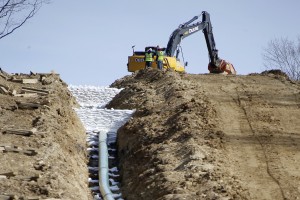Attorneys advise landowners to get involved in pipeline plan
-
Marie Cusick
More than 200 people turned out for a meeting in Lancaster Thursday night to discuss a proposed interstate natural gas pipeline. The forum was aimed at educating landowners about how to handle a pipeline on their property.
The project has sparked significant controversy. Attorneys were on hand to discuss ways landowners can negotiate with a pipeline company and deal with regulatory agencies.
Oklahoma-based Williams Partners is seeking to build 177 miles of new pipeline through 10 Pennsylvania counties in an effort to bring Marcellus Shale gas southward to markets along the East Coast. Williams needs the approval of the Federal Energy Regulatory Commission (FERC) to go forward with the project.
Washington D.C.-based attorney Carolyn Elefant represents landowners in pipeline cases and says it’s important for people to educate themselves and get involved early in the process. She spoke with StateImpact Pennsylvania.
Note: this interview has been edited for length and clarity
Q: What do you want landowners to know?
A: With regard to FERC, it’s is an agency that works for everybody– not just pipelines. I think it’s important for landowners to be involved. The process is somewhat user-friendly if landowners are willing to do the legwork. The more landowners, who participate and comply with the rules—they make it more difficult for FERC to ignore their input.
Q: One of the top concerns for people is, “Does it affect my property value?” What have you seen with that?
A: These are emerging issues. As recently as five or six years ago, before YouTube was a trend, people weren’t really aware about the types of things that can happen on pipelines. But now people are seeing explosions and leaks. Even though that really isn’t pervasive, it creates that impression. And it’s that impression that can impact property values. Landowners should raise that issue in the FERC process.
Q: Is eminent domain rare? Williams has said it’s a last resort for them.
A: It is last resort. Companies do try to negotiate. Some companies are very fair and make relatively reasonable offers. I’ve seen other pipelines make offers that contain terms in them that give the pipeline more rights if it had gotten a certificate.
Q: So if I’m in this pipeline’s pathway, should I get an attorney or consult somebody knowledgeable about these issues?
A: There are two components. If you’re impacted, you should definitely intervene in the FERC process. At the same time, you should retain an attorney. Particularly once you’re approached by the pipeline with an easement, you should absolutely have an attorney look at it.
An easement is an encumbrance on your property, which for most people is their most valuable asset. To not have an attorney review the deal that’s been proposed or help you get more, I think is very irresponsible. I would definitely encourage people to do that—maybe not immediately—but at least as soon as they receive an easement or a proposal or a request to negotiate.
Q: When you say “intervene” in the FERC process, what exactly does that mean?
A: Intervening is essentially a way you become a formal party to the proceeding. Anybody can file a comment. And I would say a commenter is more like an observer. When you’re just observing something you don’t necessarily have a right to find out if there are any changes.
When you’re a party, you get certain rights. One of those rights is to be informed and updated when there are filings in the docket, and it also gives you the ability to raise a challenge if there’s a change in the policy later on.
It’s sort of like a sports game. The commenter is like someone who goes occasionally to a game and buys ticket. A party is more like a season ticket holder—somebody who’s got a stake.
Q: In your experience does FERC really listen? Do the companies really listen? Because some people have this sense of inevitability, like the company will do what it wants and FERC will rubber stamp it.
A: Unfortunately, this is what I’ve seen so far. But I think at some point the dynamic is going to change. Up until the past few years many landowners participating in the process really weren’t doing themselves a service—partly because they didn’t understand the process—and it was really easy for FERC to ignore the input.
Also, several years back the only types of people who would oppose these projects were more like outside agitators, rather than people who were directly and adversely impacted. I think once you start getting landowners involved on a mass scale, it creates a little more incentive for FERC to look at this a little bit more closely.
Landowners are becoming increasingly savvier, based on each experience. So now you may have landowners pulling together to hire a safety expert who will perform a safety analysis. FERC can ignore that, but it becomes increasingly more difficult. Because at the end of the day the court is a check on what FERC does. Even though the court doesn’t often overrule FERC, it will from time to time. There was a recent D.C. circuit court decision that sent a FERC decision back.
Q: Any other advice for landowners?
A: I would say to keep tracking this information. Definitely get involved. Form a group with other people if you can’t do it yourself. Even if it does seem like it’s an inevitably—and I will say, most of these pipelines are approved—there are still opportunities to change the route and mitigate the impacts. In many cases just moving a pipeline a couple of feet can make a huge difference to a property owner.

















